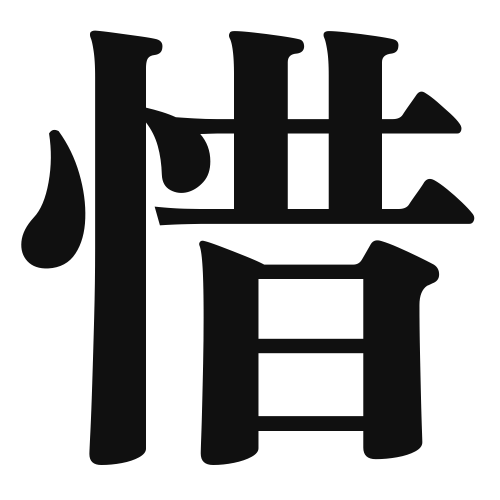1. Overview of Meaning
The kanji “惜” (pronounced “oshi” or “seki”) generally means “to regret” or “to be sorry.” It conveys a sense of valuing something and feeling sorrow over its loss or the inability to attain it.
2. Formation and Radical
Formation of the Kanji: The kanji “惜” is a compound character (会意文字) that combines elements to convey its meaning. It consists of the radical for “heart” (心) at the bottom, indicating emotions, and the character “石” (stone) at the top, which can symbolize something valuable or hard to obtain.
Radical: The radical of “惜” is 心 (shin), which relates to feelings and emotions.
3. Examples of Usage
Common Words and Phrases: Some common words that include “惜” are “惜しい” (oshii – regrettable) and “惜しむ” (oshimu – to regret or to be reluctant to part with).
Example Sentences in Daily Conversation:
- 彼はそのチャンスを惜しんでいる。 (Kare wa sono chansu o oshinde iru.) – He regrets missing that opportunity.
- 惜しい結果だったが、次はもっと頑張ろう。 (Oshii kekka datta ga, tsugi wa motto ganbarou.) – It was a regrettable result, but let’s do our best next time.
4. Synonyms and Antonyms
Similar Kanji: A similar kanji is “悔” (kai), which also means “to regret,” but it often carries a stronger connotation of remorse or guilt.
Antonyms: An antonym of “惜” is “快” (kai), which means “pleasant” or “comfortable,” indicating a lack of regret or sorrow.
5. Cultural and Historical Background
Relation to Japanese Culture: The concept of “惜” is deeply embedded in Japanese culture, where valuing relationships and opportunities is significant. It reflects a cultural tendency to appreciate what one has and to feel sorrow over losses.
Proverbs and Idioms: One common saying is “惜しむべきは、失うこと” (Oshimubeki wa, ushinau koto), which translates to “What should be regretted is losing something.” This highlights the importance of cherishing what we have.
